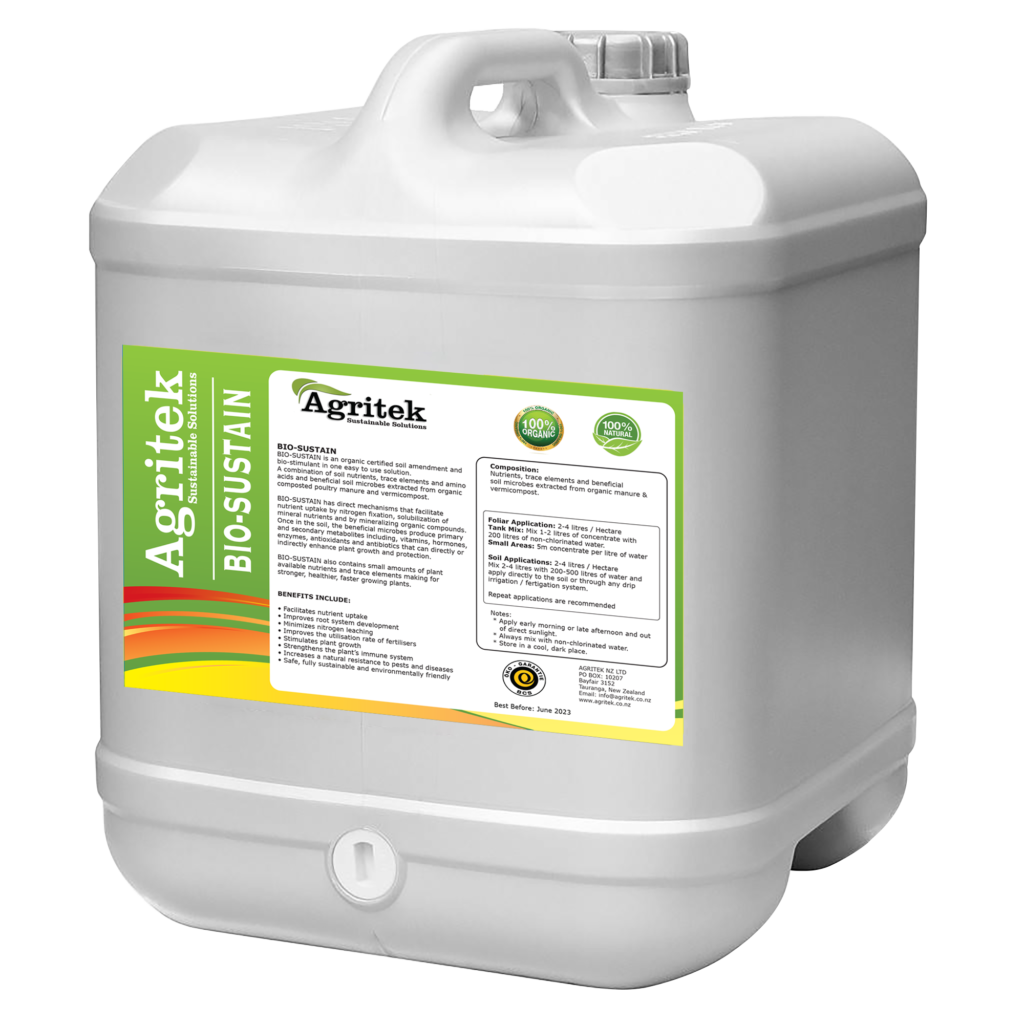We are committed to producing safe, dependable, high-quality natural & organic agronomic inputs.
BIO-SUSTAIN
Unsurpassed Technology;
BIO-SUSTAIN is a liquid Bio-fertiliser, bio-stimulant and soil amendment in one easy to use solution. It contains beneficial soil microbes that facilitate the uptake of NPK and other minerals by converting them into forms that the plant can easily absorb. It increases biological activity in the soil rhizosphere helping increase nutrient uptake, water use efficiency, drought tolerance and plant disease resistance. The beneficial microbes in BIO-SUSTAIN also produce metabolites including, enzymes, antioxidants, vitamins, hormones and antioxidants that directly or indirectly enhance plant growth and protection. BIO-SUSTAIN also contains small amounts of nutrients making for stronger, healthier, faster growing plants
Bio-Sustain contains N fixing Bacteria:
Nitrogen is an essential element for all forms of life and it is the most vital nutrient for plant growth and productivity.
Nitrogen is found naturally in organic matter, manures and other organic fertilisers. Nitrogen is a key nutrient for plant growth.
Four forms of nitrogen are used as fertiliser:
- Nitrate,
- Ammonia,
- Ammonium
- Urea.
Bacteria At Work
- Urea is broken down by specific soil bacteria to become ammonia.
- Ammonia is broken down into ammonium by mineralising bacteria.
- Ammonium is broken down into nitrite and then nitrate by nitrifying bacteria.
Plants Absorb Nitrogen
- Plants can absorb nitrogen either as nitrate (NO3-) or ammonium (NH4+), and so the total uptake of nitrogen usually consists of a combination of these two forms.
- Bio-Sustain facilitates nitrogen uptake through a ammonification and nitrification conversion process making it readily available for the plants to absorb.
Bio-Sustain contains Phosphate solubilising Bacteria (PSB):
Phosphorus
Phosphorus (P) is a major essential nutrient for plant growth. It plays an important role in virtually all major metabolic processes in plant including photosynthesis, energy transfer, signal transduction, macromolecular biosynthesis and respiration.
Due to immobilisation of phosphate by mineral ions such as Fe, Al and Ca and organic acids, the rate of available phosphate in soil is well below plant needs. Phosphorus is an anion and binds rapidly to cations like calcium, iron and aluminium. it becomes tightly bound or “locked up”, and difficult for plants to access.
Bio-Sustain contains bacteria which can solubilise and mobilise Phosphate through microbial interactions making it readily available for plant uptake.
Bio-Sustain contains Potassium solubilising Bacteria (KSB):
Potassium
Potassium (K) is the third major essential nutrient for plant growth. It plays a key role in the growth, metabolism, and development of plants. The concentrations of soluble potassium in the soil are usually very low and more than 90% of potassium in the soil exists as insoluble minerals. Bio-Sustain contains Potassium solubilising bacteria (KSB) which solubilise K through microbial interactions effectively releasing potassium into forms that plants can easily absorb.
HOW IT WORKS:
The process begins with specifically selected bacteria that have been isolated from highly fertile soils and exhibit optimum abilities to produce enzymes and other organic nutrients.
The bacteria are selected for maximum adaptability so that they are effective in many different soil conditions, and provide unique abilities to fix both natural (atmospheric) nitrogen and synthetic (chemical) nitrogen delivered by fertilisers. When Bio-Sustain is applied to soil, indigenous bacteria multiply and grow very rapidly.
As the biological health of the soil improves, minerals become more available to plants and nutrient uptake is increased by 200 – 300%, with nitrogen utilisation increasing by 50 – 75%. Nitrogen dissipation (gaseous escape) is greatly reduced, and leaching (run off and seepage into the water table) is almost eliminated.
Increasing the biological content of a soils’ ecosystem makes the soil more permeable, allowing the soil to absorb more water and healthy populations of microorganisms metabolise fertilisers and nutrients that have lain unused in the fields for years, making these nutrients available to plants growing today.
When bacteria digest and metabolise fertilisers in the field, fertiliser is kept out of our water resources and is delivered where it belongs, to the plant. Less residual chemical fertiliser in the soil means fewer toxins reaching our water resources.
Making the soil ecosystem healthy relieves stress on plants of all types, and allows them to utilise their own immune systems to ward off predatory herbs (weeds) and pests (insects), resulting in reduced herbicide and pesticide input requirements — and costs.
Whether on your farm, your golf course, your home, or your garden, increasing the microbial activity in your soil will improve the fertility of your soil and the quality and quantity of your crop, while reducing the need for inputs such as water, herbicides, pesticides and fertiliser.
The Benefits
- Stimulates root growth development.
- Enhances nutrient absorption.
- Enhances soil fertility.
- Rapidly increases beneficial soil microbes.
- Helps release bound nutrients and minerals in the soil.
- Improves plant growth & crop yield.
- Minimises nutrient leaching.
- Improves the utilisation rate of fertilisers.
- Increases a natural resistance to pests and diseases.
- NZ made and fully sustainable.

